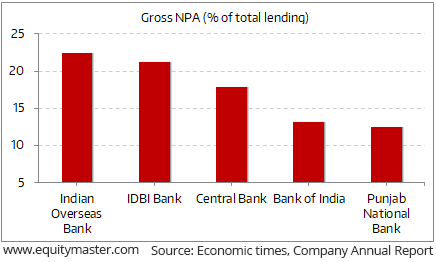Management Stands by as Lenders Take Over This Company
- In this issue:
- » Rising NPAs at Indian banks
- » FMCG companies to benefit in the GST era
- » Market roundup
- » And more!

The banks are moving in to take control of this company's assets. And what's the company's management doing?
Well, nothing...
On Monday, SBI moved the National Company Law Tribunal (NCLT) to recover its dues by taking control of the company's assets and managing its operations under the newly introduced Insolvency and Bankruptcy Code.
And reports suggest the company in question - Electrosteels Steels Ltd - has decided not to oppose the move.
How did it come to this?
Livemint reports that Electrosteels Steels is one of the biggest loan defaulters in the country with a total outstanding of around Rs 140 billion. The company has failed to repay its debt since April 2015. Lenders tried to rescue the company by offering a fresh loan. The company still couldn't turn the corner.
In these euphoric times of rising markets and sizzling IPOs, it is important to remember companies like Electrosteels.
Why?
Because in late 2010, markets were making new highs and IPOs were selling like hot cakes - much like today. In the euphoria, Electrosteels too sneaked in its IPO (Subscription Required). The company hadn't even finished one full year of operations and had no earnings or revenue history. In fact, one of the main purposes of its IPO was to finance its maiden manufacturing plant!
Frankly, we were aghast. This was not retail investor material. At such an early stage of the company's development, we reckoned the uncertainty was incredibly high and a number of things could go wrong. In such cases, early-stage private equity players with in-depth and specialised industry knowledge, unlimited access to the management, and a presence on the board would be a far more suitable investor category to fund such ventures.
The inherent risks quickly reared their head. The company had execution issues, went bankrupt in a couple of years, and has struggled ever since. After the IPO price of Rs 10-11 per share, it went as low as Rs 2 per share. It still trades more than 50% below its IPO price nearly seven years later.
And now the management is standing by as lenders take over the company.
These are ironic times indeed. On one side, we have a new wave of IPOs full of rosy projections being snapped up by excited investors. On the other side, we have an older batch of IPOs, which debuted to similar fanfare, experiencing a crash landing.
In the big bad world of IPOs, many a management promise turns out to be a mere mirage.
Yes, there are riches to be had. But only if you know how to spot the few true opportunities among the many wealth destroyers. Having this ability is more relevant now than ever.
To help you develop this valuable skill, we've put out a completely free IPO report that'll reveal all you need to know to find those money spinning IPOs and avoid the disasters in the coming year and beyond.
02:15 Chart of the Day
Rising Bad Loans at Indian Banks
The Electrosteels Steels Ltd debacle is one more example of the trouble that Indian banks face. In its recent financial stability report, the Reserve Bank of India (RBI) further highlighted the challenges the banking sector faces.
Gross non-performing assets (GNPA) of Indian banks rose from 9.2% in September 2016 to 9.6% in March 2017. GNPA refers to the total value of loans on which interest and principal income has not been received by the bank for more than ninety days. For some banks, the ratio of GNPAs to total lending is more than 20%. This means more than Rs 20 out of every Rs 100 lent is at the risk of not coming back.
The RBI expects the average GNPA ratio to increase to 10.2% by March 2018. It indicated that if macroeconomic conditions worsen, this number could go up.
The report stressed the risks banks face due to their exposure to the infrastructure sector. Any shock to the infrastructure sector could considerably impact the profitability of Indian banks. Banks have begun to reduce lending to the infrastructure sector. Credit to the power sector, which accounts for 50% of the infrastructure sector, fell 3.6% in May. Credit to road sector was down 5.7% in May.
Although cutting lending seems to be a safety measure to protect bank profitability, it is anything but a good sign for the Indian economy. More than half of the stressed loan assets belong to the infrastructure, construction, oil & gas, power, real estate, and telecom sectors. These sectors are normally the pillars for economic growth. If the problem persists, banks will become increasingly reluctant to lend to these sectors. This would hurt India's long-term growth.
Unlike the banking sector, FMCG is one sector that looks promising - especially after the implementation of the Goods and Services Tax (GST). For one, efficiencies of FMCG companies are set to improve. Inter-state movement of goods, which used to be a major headache for these companies are likely to reduce. As a result, turnover times are expected to increase, which will lead to an increase in revenue as well as profitability.
Also, earlier, due to different tax rates, FMCG companies were forced to set up warehouses and depots in multiple states across the country. Ideally, depots would be in a location that optimises distribution and logistics costs. But FMCG companies were often forced to set up depots in far-flung locations to save on interstate sales tax. GST is expected to reduce the number of warehouses and bring down costs for these companies.
In terms of post-GST tax rates, FMCG products such as hair oil, soaps, and toothpastes now fall under an 18% tax slab compared to 22-24% earlier. But with the government's anti-profiteering clause in place, companies will have to pass on the tax benefits to the consumer under the new tax regime. Lower prices are likely to increase consumer demand but are unlikely to improve margins significantly for FMCG companies.
The biggest impact is likely to come from the shift from the unorganised to the organised players. Large FMCG companies are likely to gain market share from rural areas once everyone comes under the GST tax net. Small players unable to cope with the new tax regime will give way to organised players.
In terms of valuations, the market seems to have already factored in the positive effect of GST. The BSE FMCG index is up 30% since the start of 2017. For investors, the lofty valuations of these FMCG companies could negate strong growth in these companies.
The Indian stock markets were trading marginally higher at the time of writing on the back of sustained buying pressure mainly in the energy and telecom sectors. At the time of writing, the BSE Sensex was trading up around 31 points while the NSE Nifty was up around 16 points.
04:50 Investment Mantra of the Day
"When you combine ignorance and leverage, you get some pretty interesting results." - Warren Buffett
Today's Premium Edition.
Interest Rates Are Driving This Bull Rally
Interest rates are a key macroeconomic variable that have far-reaching consequences on economic growth, corporate profitability, and how people invest their money.
Read On...
| Get Access
Recent Articles
- All Good Things Come to an End... April 8, 2020
- Why your favourite e-letter won't reach you every week day.
- A Safe Stock to Lockdown Now April 2, 2020
- The market crashc has made strong, established brands attractive. Here's a stock to make the most of this opportunity...
- Sorry Warren Buffett, I'm Following This Man Instead of You in 2020 March 30, 2020
- This man warned of an impending market correction while everyone else was celebrating the renewed optimism in early 2020...
- China Had Its Brawn. It's Time for India's Brain March 23, 2020
- The post coronavirus economic boom won't be led by China.
Equitymaster requests your view! Post a comment on "Management Stands by as Lenders Take Over This Company". Click here!
1 Responses to "Management Stands by as Lenders Take Over This Company"



Jamshed F. Mehta
Jul 13, 2017Dear Equitymaster.
Yes, ESL has failed early investors.
But you have not been entirely fair treating ESL's case.
AS far as my limited knowledge goes they have not been out and out crooks, but I could be wrong.
That said, I would say there is much dirt in the Essar Steel case, as a matter of fact in the whole of Essar and now they have started delay legislation.
j.